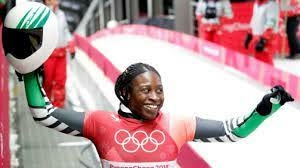Elite Nigerian monobob and skeleton competitor Simidele Adeagbo has lodged a formal complaint with the International Bobsleigh and Skeleton Federation (IBSF).
In the complaint, she alleged gender discrimination in the spots allocated to men and women at the ongoing Beijing Winter Olympic Games.
In a letter to the IBSF obtained by Reuters, lawyers for the 2018 Pyeongchang Olympian said she was excluded from the 2022 Olympic monobob event by a single spot.
She claimed this was due to “an insidious and willful gender disparity in the number of sled spots made available for men and women.”
IBSF did not immediately respond to a request early on Wednesday in Beijing for comment.
“It is only because of this gender discrimination that Ms. Adeagbo was deprived of the opportunity to compete in the 2022 Winter Olympics,” attorneys Jeffrey L. Kessler and Cardelle Spangler wrote.
The monobob was introduced to the Olympic programme for the Beijing Games with the intention of bolstering the number of women who can compete in the bobsleigh events in Beijing.
Men are allocated 28 sled spots in the four-man bobsleigh event and 30 spots in the two-man, while women are allotted 20 spots in the monobob and 20 in the two-person bobsleigh.
Fourteen of the 20 monobob competitors also competed in the doubles.
“When I hear the narrative around monobob, I think that ‘wow, that sounds great’. But when you peel back the layers it’s not actually what is happening – it didn’t in fact create the opportunities they may be intending it to,” Adeagbo told Reuters.
“There’s enough high-calibre athletes,” she added. “Instead, women are being left at home.”
The letter indicated that Adeagbo would initiate an arbitration proceeding before the Court of Arbitration for Sport on Feb. 25 if the IBSF can not provide “dispute resolution procedures” for her to exhaust first.
“Equal treatment for female athletes requires the IBSF and IOC (International Olympic Committee) to allocate the same number of sled spots to women bobsledders as men participating in events in the same tier of competition,” the letter read.
The IOC did not immediately respond to a request for comment.
Adeagbo finished 20th out of 20 in the skeleton in Pyeongchang and last month won the monobob European Cup race in Winterberg, Germany.
She thus became the first African athlete to win an international bobsleigh race.
The letter comes as the IOC faces criticism over geographic representation at the Winter Games.
African winter sports athletes suffered a blow after the IOC denied a request by the coaches of Ghana’s Akwasi Frimpong to reinstate continental quotas in bobsleigh and skeleton for the Beijing Games.
Their removal left sliding sports with no African representation.
Speaking to reporters about African athlete inclusion on Tuesday, the IOC’s Director of Olympic Solidarity James Macleod said access to winter sports is a “different ball game” than summer sports.
“International federations set the qualification rules for access to the Games whether summer or winter.
“We need to work closely with them to find that balance, to find the best athletes and attract representation from a diverse number of national Olympic committees (NOCs),” said Macleod.
“There is a review of those systems. There will be one after these Games of Beijing as well.”
While missing the chance to compete in Beijing was heartbreaking, Adeagbo said she was undeterred.
“I want more women to be able to seize their moment and with the rules that we have in place currently that is limiting our opportunities to show up to the line,” she said.

















Discussion about this post